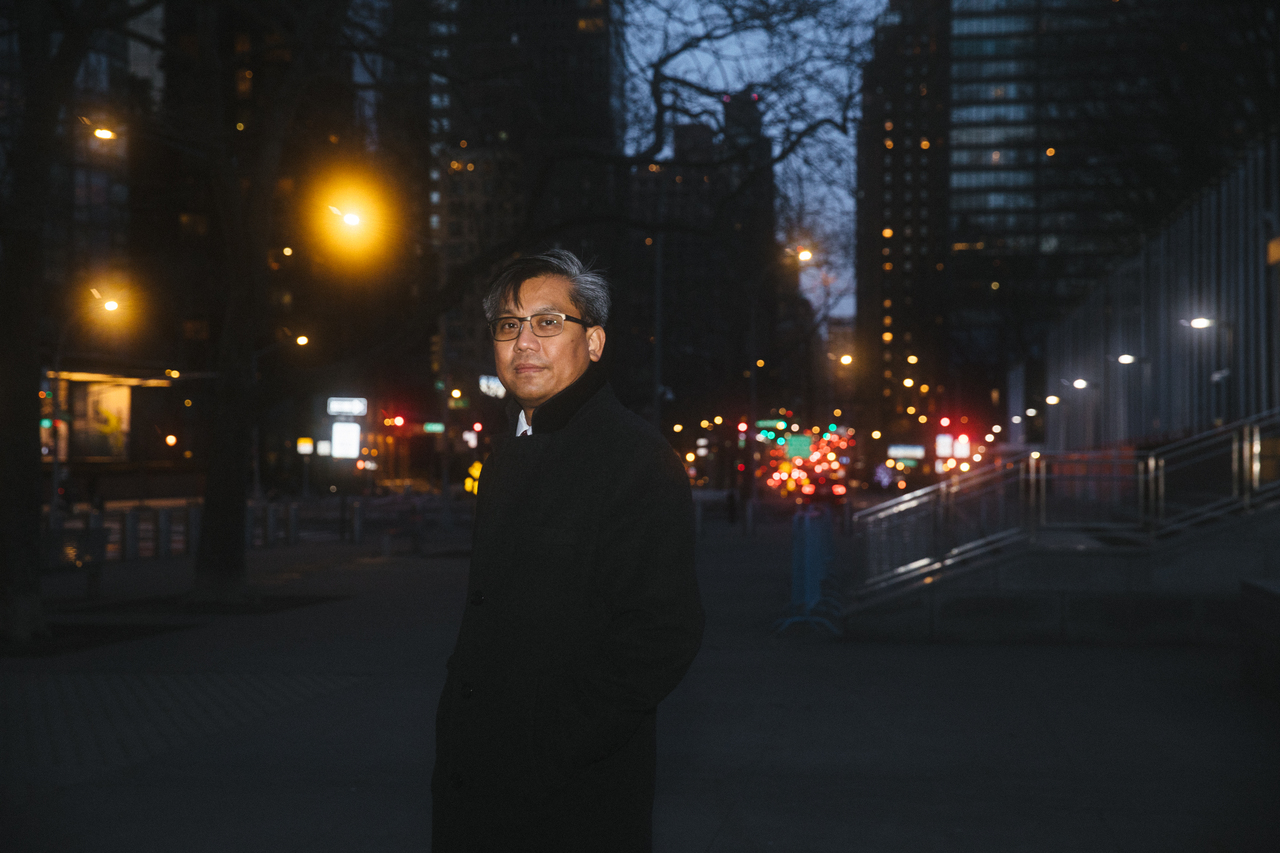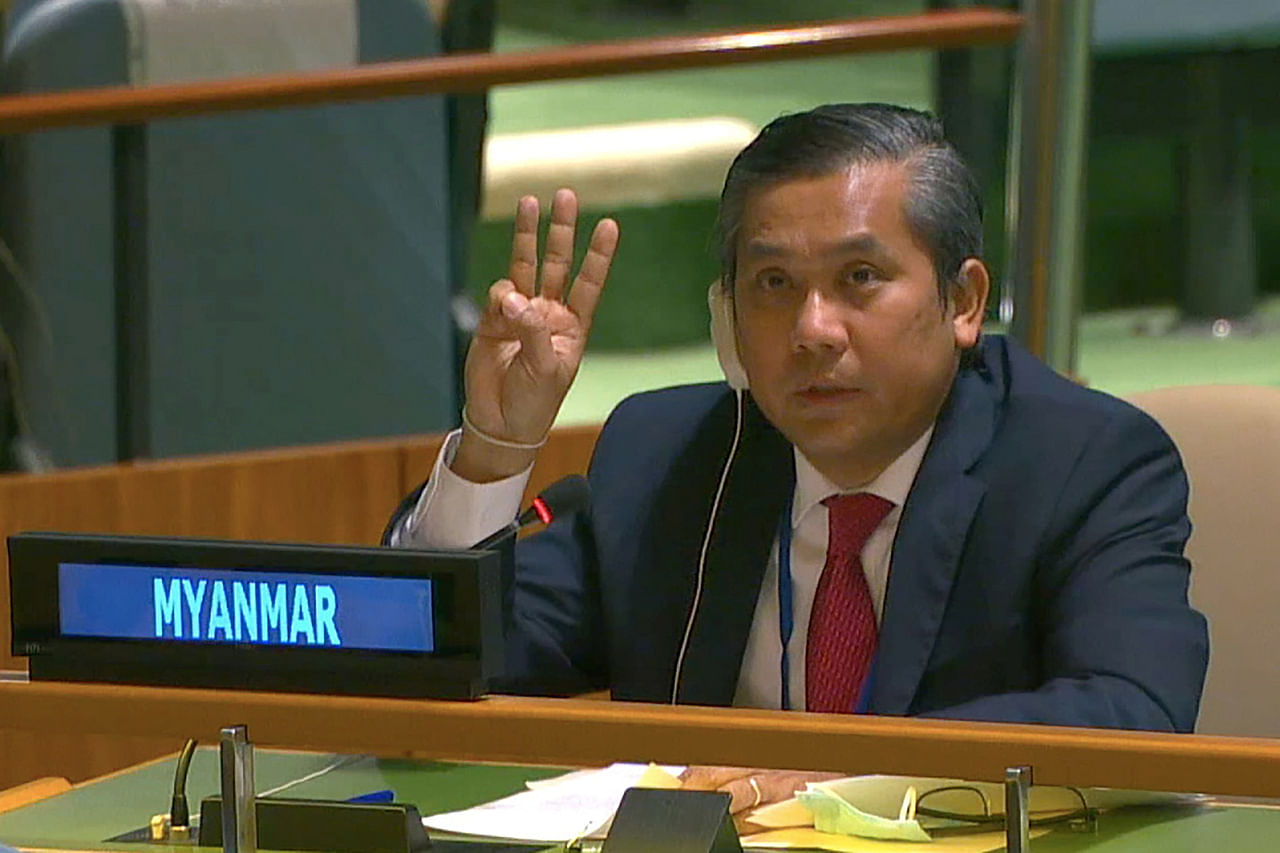After coup in Myanmar, career diplomat Kyaw Moe Tun takes a stand
Sign up now: Get ST's newsletters delivered to your inbox

Mr Kyaw Moe Tun in New York City on Feb 11, 2021.
PHOTO: NYTNS
Follow topic:
WASHINGTON (NYTIMES, REUTERS) - He knew his voice was quavering. But Mr Kyaw Moe Tun, Myanmar's top envoy at the United Nations, kept going. The military rulers who had overthrown Myanmar's elected government and gunned down peaceful protesters were illegitimate, he said.
The words stumbled out, both a bit too high and a bit too low.
"We will continue to fight for a government which is of the people, by the people, for the people," he said.
Mr Kyaw Moe Tun, a 51-year-old diplomat in a sombre suit and tie, raised his hand in the three-finger salute of defiance from the "Hunger Games" films, which has come to symbolise Myanmar's millions-strong protest movement against the coup-makers.
The UN General Assembly meeting in New York resounded with applause.
When Mr Kyaw Moe Tun got home that night, on Feb 26, his family gathered around him. He had not told them what he had planned to do, he said.
His 12-year-old daughter, like any preteen girl, had some feedback: "Dad, you did the three-finger salute all wrong. Your fingers are supposed to be together, not apart."
She said she was proud of him anyway, Mr Kyaw Moe Tun recalled.
"The young generation, they know about democracy," he said. "I also know about democracy, and I wanted to do something with maximum impact to show how shocked I am that in the modern world for a military to have a coup like this is not acceptable."
When the generals seized full power in Myanmar on Feb 1, curtailing a decade-long experiment with limited democratic reforms, they surely did not expect that it would ignite so much resistance among those responsible for the functioning of society: diplomats, teachers, doctors, railroad workers, bank tellers, power station employees, even police officers.
As young, unarmed protesters have poured onto the streets every day, defying bullets and arbitrary detention, others have sustained a civil disobedience movement, known in Myanmar as CDM, by refusing to work for the military overlords. Much of the state has stopped operating. Banks are closed, and government clinics are empty. Some train lines have been stilled.
And in the rarefied confines of Myanmar embassies around the world, diplomats are struggling with whether to represent a military that has locked up their elected leaders.
"I decided whatever I will do, I will resist," Mr Kyaw Moe Tun said. "I will never accept the military regime."

Mr Kyaw Moe Tun raising his hand in the three-finger salute of defiance from the "Hunger Games" films.
PHOTO: UNITED NATIONS
Not born a rebel
Mr Kyaw Moe Tun was not born a rebel. His father worked for a socialist party associated with the army chief who staged Myanmar's first coup in 1962, ushering in nearly a half-century of isolationist military rule.
In 1988, when other students at the University of Yangon joined mass pro-democracy demonstrations, he stayed off the streets of Myanmar's biggest city.
"To be very frank, I did not take part in the protests," Mr Kyaw Moe Tun said. "My parents wanted me at home."
One of his classmates in international relations was Mr Ko Ko Gyi, who would gain fame as a student leader of the 1988 movement. After the military crushed those protests, Mr Ko Ko Gyi spent 17 years in prison.
"I'm surprised and so proud that U Kyaw Moe Tun actively joined the CDM," Mr Ko Ko Gyi said in an interview.
After the bloody suppression of the 1988 protests, universities were forced to close.
Mr Kyaw Moe Tun was a third-year student without a degree or a way to make a decent living. Burma, as the country was then known, may have once been renowned for its polyglot cities, fertile rice paddies and leading universities, but decades of inept army rule had left the country to rot.
Like millions of people from Myanmar, Mr Kyaw Moe Tun escaped overseas as a migrant worker. He assembled refrigerators and spray-painted fluorescent light covers in Malaysia, then joined a ship crew in Singapore.
That first trip abroad, in December 1988, astonished him. Landing at the Bangkok airport, he found the air conditioning sumptuous, the television intoxicating. And there were lights everywhere, a feast of electricity. Yangon perpetually suffered blackouts, darkness descending after sundown; the sticky air was not conditioned.
After schools reopened in 1991, Mr Kyaw Moe Tun came home. It was hard, he said, to describe to his parents just how much his homeland lagged behind most of the region. By the turn of the century, financial sanctions, imposed by Western nations on Myanmar for the junta's appalling human rights record, were pulling the country even further behind.
After graduating from college, Mr Kyaw Moe Tun rose steadily in the Ministry of Foreign Affairs, even as some of his former classmates suffered as political prisoners. He served as a third secretary at the embassy in Jakarta, Indonesia's capital, then worked in New York and Singapore.
Staying put
On Feb 27, one day after he urged countries at the 193-member UN General Assembly to use "any means necessary" to reverse the military's coup, Mr Kyaw Moe Tun was fired by Myanmar's military rulers, and accused of high treason.
But he refused to go, and the diplomat who was chosen to replace him quit. The UN itself has declined to recognise Mr Kyaw Moe Tun's dismissal.
For now, at least, he is staying.
"I'm a civil servant, and I take instructions from the government, but the military illegally took state power," Mr Kyaw Moe Tun said. "This is the time to express our true colours, our real desires. It's our duty to Myanmar people."

